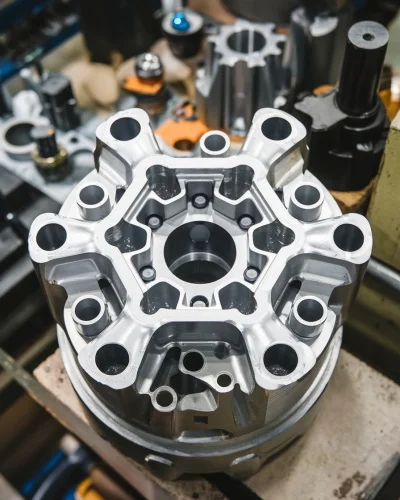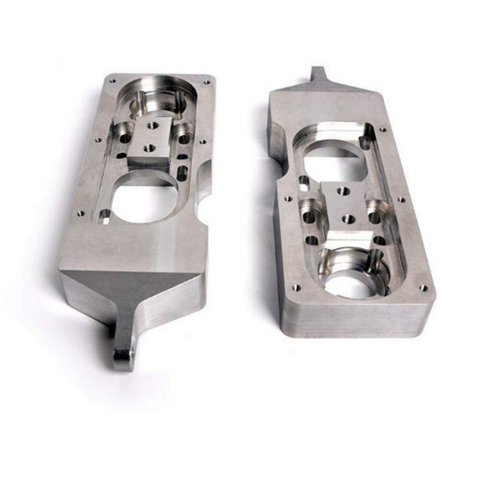The Function of Light Weight Aluminum Foundries in Advancing Lightweight Production Solutions
Light weight aluminum factories significantly add to the development of lightweight production solutions. Their cutting-edge casting innovations yield high-strength, lightweight elements necessary for industries such as automobile and aerospace. This development not only enhances item performance however likewise promotes sustainability via using recycled materials. As these foundries adapt to emerging technologies and techniques, they lead the way for future developments in making effectiveness and environmental duty. What lies in advance in this transformative journey?
The Advantages of Lightweight Materials in Manufacturing
As industries significantly seek effectiveness and sustainability, the adoption of light-weight materials in production has actually become an essential technique - Aluminum Foundry. These products, especially aluminum and compounds, use countless benefits that boost manufacturing processes and item efficiency. Mainly, their decreased weight contributes to reduce power usage during transportation and operation, causing significant cost savings
Additionally, lightweight materials help with the layout of even more facility geometries, enabling better innovation in product advancement. This adaptability frequently causes enhanced capability and efficiency, catering to the advancing demands of modern-day customers.
Additionally, using light-weight products can boost the longevity of products because of their resistance to deterioration and tiredness. This resilience not just minimizes upkeep costs yet also sustains sustainability campaigns, as longer-lasting products contribute to much less waste. To summarize, the advantages of lightweight materials are critical in driving performance, advancement, and ecological duty in production.
Developments in Aluminum Spreading Technologies
Current improvements in light weight aluminum casting technologies are revolutionizing the production landscape, specifically in the manufacturing of light-weight components. Developments such as high-pressure die casting and vacuum cleaner pass away spreading have actually greatly enhanced the accuracy and surface area coating of aluminum parts - Aluminum Casting Company. These approaches permit the development of complicated geometries while reducing product waste and boosting mechanical residential or commercial properties

Additionally, the application of real-time tracking systems assures quality assurance throughout the spreading process, leading to more regular product end results. Jointly, these developments not only boost the performance of aluminum elements however likewise sustain the industry's change in the direction of even more lasting production methods.
Applications of Light Weight Aluminum Parts in Numerous Industries
While aluminum elements have long been used in numerous industries, their convenience and light-weight homes continue to drive cutting-edge applications throughout industries such as automotive, aerospace, and building and construction. In the automotive industry, light weight aluminum is significantly used for engine blocks, wheels, and body panels, boosting fuel effectiveness and performance. Aerospace makers utilize aluminum for airplane structures and elements, exploiting on its strength-to-weight proportion to boost fuel economy and payload capacity.
In the building market, aluminum is favored for window frames, roofing, and structural components, providing toughness and resistance to rust while reducing overall building weight. Furthermore, the electric and electronics sectors gain from aluminum's conductivity and light-weight nature, using it in circuitry, enclosures, and heat sinks. These varied applications highlight the critical function of light weight aluminum parts, which not just fulfill industry demands yet also add to advancements in item design and performance across multiple areas.
Sustainability and Power Effectiveness in Light Weight Aluminum Foundries
The aluminum shop sector plays a vital role in advertising sustainability and energy performance, particularly as need for lightweight elements continues to expand across various markets. Shops are increasingly embracing eco-friendly practices, such as utilizing recycled light weight aluminum, which considerably reduces energy intake and greenhouse gas exhausts contrasted to primary light weight aluminum manufacturing.
Additionally, advancements in casting technologies improve energy effectiveness by maximizing the melting processes and reducing waste. Strategies like die casting and financial investment spreading permit precise product Learn More Here usage, lessening excess and scrap.
Furthermore, several factories are spending in renewable power resources to power procedures, further reducing their carbon impact. Implementing energy administration systems allows foundries to keep an eye on and boost power use, ensuring they operate at peak effectiveness.

Future Fads in Lightweight Manufacturing Solutions
Exactly how will arising technologies shape the future of lightweight manufacturing options? Technologies such as innovative products, automation, and additive manufacturing are readied to redefine manufacturing processes. The assimilation of clever production innovations, including the Web of Things (IoT) and artificial knowledge (AI), will make it possible for real-time monitoring and optimization, enhancing efficiency and lowering waste.

As sustainability remains to be an extremely important concern, lightweight remedies will significantly concentrate on reusing and reusing products, aligning with circular economic climate principles. This development in lightweight manufacturing will not just improve item efficiency yet likewise contribute to ecological goals, ensuring that the industry remains competitive in a swiftly altering market landscape.
Regularly Asked Concerns
Exactly How Do Aluminum Foundries Make Sure Quality Assurance in Production?
Light weight aluminum shops guarantee top quality control in production through rigorous testing, standardized treatments, and constant monitoring - Aluminum Foundry. They apply innovative technologies and knowledgeable employees to keep consistency, lower problems, and fulfill industry standards throughout the production procedure
What Are the Main Tests Encountered by Aluminum Foundries?
Aluminum factories face obstacles such as varying raw material costs, preserving production effectiveness, ensuring regular high quality, adapting to technological innovations, and conference ecological guidelines, every one of which influence their general operational efficiency and competitiveness on the market.
Just How Does Aluminum Recycling Effect Shop Operations?
Light weight aluminum recycling significantly improves shop operations by minimizing resources costs, reducing power consumption, and reducing environmental impact. This lasting technique enables shops to enhance performance while satisfying raising need for light-weight, high-performance light weight aluminum items.
What Skills Are Required for Workers in Aluminum Foundries?
Employees in aluminum shops require abilities in metallurgy, machining, quality control, and safety techniques. Efficiency in running equipment, recognizing alloy residential properties, and analytical are likewise crucial for efficient manufacturing and preserving high security standards.
Just How Do Aluminum Foundries Deal With Waste Monitoring?
Light weight aluminum factories manage waste with recycling scrap metal, making use of reliable waste segregation techniques, and sticking to ecological laws. They execute lasting methods to lessen landfill contributions, making sure that dangerous materials are thrown away properly.
Aluminum shops considerably contribute his explanation to the advancement of light-weight manufacturing options. Current innovations in aluminum spreading innovations are revolutionizing the manufacturing landscape, particularly in the manufacturing of lightweight components. While aluminum components have long been made use of in numerous industries, their flexibility and lightweight residential properties proceed to drive ingenious applications throughout fields such as automobile, aerospace, and building and construction. Furthermore, the electric and electronic devices sectors profit from aluminum's conductivity and lightweight nature, using it in circuitry, enclosures, and warm sinks. The light weight aluminum factory sector plays a crucial function in advertising sustainability and energy performance, especially as demand for lightweight elements proceeds to expand throughout numerous industries.